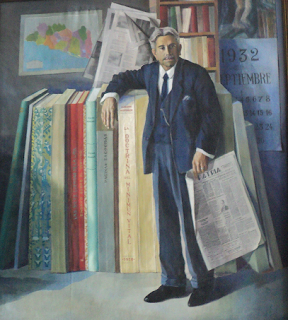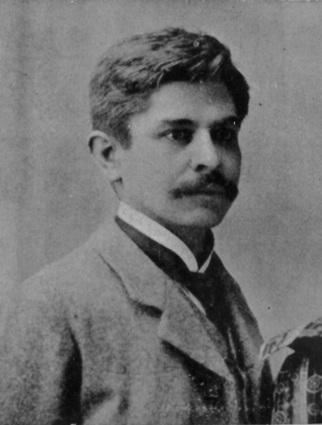Alberto Masferrer on:
[Wikipedia]
[Google]
[Amazon]
Vicente Alberto Mónico Masferrer (24 July 1868 – 15 May 1949) was a Salvadoran essayist, philosopher, politician, and journalist best known for the development of the philosophy of 'Vital Minimum' or 'Vitalismo' in Spanish. He was born in Alegría,


Usulután
Usulután () is the fifth largest city in El Salvador, and capital of the Usulután Department in the south-east of El Salvador.
As of 2006, it is estimated to have population of 71,636 people. Usulután rests in a rich agricultural valley and ...
formerly Tecape, Usulután in El Salvador on 24 July 1868. He did not receive a formal education, instead claiming to have been educated by "the university of life," but he did travel widely, having lived in several Central American countries, as well as in Chile, New York, and several European nations. During his public career at the Ministry of Foreign Affairs of El Salvador, he served as an ambassador of El Salvador in Argentina, Chile, Costa Rica, and Belgium, and served as a professor in Guatemala, El Salvador, Honduras, Costa Rica, Chile, and Argentina. Having served in the government of President Arturo Araujo, he was sent into exile in Honduras by the dictatorship of Maximiliano Hernández Martínez
Maximiliano Hernández Martínez (21 October 1882 – 15 May 1966) was a Salvadoran military officer and politician who served as president of El Salvador from 4 December 1931 to 28 August 1934 in a provisional capacity and again in an offi ...
following the uprising of 1932 known as La Matanza
( Spanish for 'The Massacre') refers to a communist- Indigenous rebellion that took place in El Salvador between 22 and 25 January 1932. After the revolt was suppressed, it was followed by large-scale government killings in western El Salv ...
, dying that same year on 8 September in the city of Tegucigalpa
Tegucigalpa ( )—formally Tegucigalpa, Municipality of the Central District ( or ''Tegucigalpa, M.D.C.''), and colloquially referred to as ''Tegus'' or ''Teguz''—is the capital and largest city of Honduras along with its sister city, Comaya ...
, Honduras. Masferrer was well respected throughout his life, having earned the praise of such major Salvadoran figures as Arturo Ambrogi, Miguel Ángel Espino, Claudia Lars
Claudia Lars, born in Armenia, El Salvador on December 20, 1899 as Margarita del Carmen Brannon Vega, was a Salvadoran poet. She died in San Salvador in 1974. She was the daughter of Peter Patrick Brannon and Carmen Vega Zelayandía.Plumlee, A. ...
, and Salarrué.
Early life
Vicente Alberto Mónico Masferrer was born on 24 July 1868 in Tecapa (now Alegría), a municipality in theUsulután Department
Usulután (; from the Nawat language, meaning "city of the ocelots") is a Departments of El Salvador, department of El Salvador in the southeast of the country (Lenca region). The capital is Usulután.
Created on June 22, 1865, it is El Salvado ...
of El Salvador. He was born out of wedlock to Enrique Masferrer, an agriculturalist and former Salvadoran legislator, and Leonor Mónico. He began his primary education at a rural school of a French woman by the name of Agustina Charvín. Masferrer was later transferred to a different institute run by a Cuban, Hildebrando Martí. There, he openly criticized the usage of corporal punishment by his teachers, stating that the methods were "outdated" and part of a "Eurocentric curriculum" which, according to him, were far removed from life in El Salvador.
Following his continuous rebellious behavior at Martí's school, Masferrer's father moved both him and his younger half-brothers Eduardo and Enrique Masferrer Crespo to a boarding school in Guatemala. Masferrer ran away from the school shortly after arrival. Following his departure from the school, Masferrer spent the rest of his teenage years travelling through Honduras and Nicaragua, and later Guatemala and Costa Rica. He worked a number of jobs during this time, from selling bottled water in Chinandega, Nicaragua with his uncle Miguel Mónico, working as a stint at a prison at Ometepe, and of course, teaching.
The home in which he was born was owned by the Mejia family and is now a small museum. His education involved a mixture of both self-teaching and formal education. His love for reading led him to choose teaching as a career later on in life. Salvadoran writer and journalist Arturo Ambrogi once stated that "I have rarely seen a lecturer as tremendous as Alberto."
Career
Writer
Masferrer became an editor for the Salvadoran newspaper El Día in 1923. In 1928, he, along with writers and journalists Alberto Guerra Trigueros and José Bernal, founded the Salvadoran newspaper Patria. Alberto was in charge of the editorial section, as well as a well-received column titled "Vivir." TheUniversity of El Salvador
The University of El Salvador (UES) is the oldest and the most prominent university institution in El Salvador. It serves as the national university of the country. The main campus, Ciudad Universitaria, is located in the capital of San Salvador ...
editorial would go on to publish the works of Masferrer thanks to Pedro Geoffroy Rivas, a poet and literary critic who compiled Masferrer's newspaper writings over the span of several years.
In addition to his popularity in El Salvador, Alberto Masferrer also gained a following in Chile for his humorous columns under the pen name "Lutrín" for both newspapers ''El Chileno'', based in Santiago, and El Mercurio
(known online as ''El Mercurio On-Line'', ''EMOL'') is a Chilean newspaper with editions in Valparaíso and Santiago. is owned by El Mercurio S.A.P. (''Sociedad Anónima Periodística'' 'joint stock news company'), which operates a network of ...
which was based in Valparaíso. In addition to these newspapers, he also published weekly works in newspapers such as ''La Reforma'' and ''The United Workers'', as well as in magazines such as ''The Republic of Central America'', ''Actualidades'', ''Scientific Literary Bibliography'', ''El Simiente'', among others. He also worked as director of the Official Journal in 1892.
His writings brought light to the social issues in El Salvador and have been characterized by his demanding of minimum rights for every person through his beliefs of Vital Minimum or Vitalismo. He dignified human beings through the usage of mainly harsh words and engaging in controversy over socially accepted customs.
Teacher
Alberto Masferrer began working as Director of the School for Boys in San Rafael del Sur in the Nicaraguan department of Rivas. Noting the poverty of the area in which he found himself in, in addition to the economic situation at the time, he began to raise pigs in order to feed the poor and frequently gave away his own earnings to any unfortunate person who crossed his path. Alberto Masferrer taught throughout Latin America in countries such as Guatemala, El Salvador, Honduras, Costa Rica, Chile and Argentina, having been named "teacher and director of Crowds" by Salvadoran poetClaudia Lars
Claudia Lars, born in Armenia, El Salvador on December 20, 1899 as Margarita del Carmen Brannon Vega, was a Salvadoran poet. She died in San Salvador in 1974. She was the daughter of Peter Patrick Brannon and Carmen Vega Zelayandía.Plumlee, A. ...
. Alberto Masferrer taught at the Salvadoran Language Academy in San Salvador


Career in politics
He began his political career as Consul of El Salvador in Argentina (1901) and later in Chile (1902), Costa Rica (1907) and Belgium (1910). Following his consulate work, he was employed at the International Court of Justice in the year 1912. Secretary of the National Institute (1890) and Advisor to the Ministry of Education (1916). Under the basic premise of the peaceful struggle for the rights of each individual, Masferrer became the ideologue and political campaign manager for the future president, the engineer Arturo Araujo in 1930. Masferrer was elected as a deputy to theLegislative Assembly of El Salvador
The Legislative Assembly () is the legislative branch of the government of El Salvador.
History
The organization was founded in 1824 as the Central American Congress ().
Structure
The Salvadoran legislature is a unicameral body.
Until ...
from Usulután
Usulután () is the fifth largest city in El Salvador, and capital of the Usulután Department in the south-east of El Salvador.
As of 2006, it is estimated to have population of 71,636 people. Usulután rests in a rich agricultural valley and ...
just a year later in 1931. He became a member of Araujo's Salvadoran Laborist Party, but soon resigned from office on 14 August 1931 due to his dissatisfaction with Araujo's presidency.
Despite his opposition to the arrival to the presidency of Brigadier General Maximiliano Hernández Martínez
Maximiliano Hernández Martínez (21 October 1882 – 15 May 1966) was a Salvadoran military officer and politician who served as president of El Salvador from 4 December 1931 to 28 August 1934 in a provisional capacity and again in an offi ...
, the military takeover was inevitable. Since then, Masferrer tried to contain the violence unleashed months later at the hands of Martínez, in , which resulted in the deaths of thousands of natives and peasants, resulting in Masferrer's exile to Honduras. His relationship with the Communist Party of El Salvador is unclear, although there are references about the pacifistic influence that he as a writer, tried, although failed.
Vital Minimum
''Vital Minimum'' or ''Vitalismo'' was a philosophical theory developed by Masferrer in several of his essays, particularly "El Mínimum Vital." This philosophy espouses the idea that all individuals, regardless of sex, race or class have the right to a basic standard of life, through equal access to education, employment, food, and shelter. Through this philosophy, Masferrer also argued forpacifism
Pacifism is the opposition to war or violence. The word ''pacifism'' was coined by the French peace campaigner Émile Arnaud and adopted by other peace activists at the tenth Universal Peace Congress in Glasgow in 1901. A related term is ...
, influenced by the efforts of Mahatma Gandhi
Mohandas Karamchand Gandhi (2October 186930January 1948) was an Indian lawyer, anti-colonial nationalism, anti-colonial nationalist, and political ethics, political ethicist who employed nonviolent resistance to lead the successful Indian ...
. The ideas of vital minimum echoes through many of Masferrer's essays, as well as in his novella ''Una Vida en el Cine''(1922).
Reception
Masferrer was, like many intellectuals, critiqued by many. The left in El Salvador would attack him, labelling him a "demagogue," "traitor" and a "right-wing socialist." Unsurprisingly, he also received a lot of criticism from El Salvador's right-wing, often being referred to as a Bolshevik, "criminal agitator" and subversive.Death
Masferrer died on 15 May 1949 inSan Francisco
San Francisco, officially the City and County of San Francisco, is a commercial, Financial District, San Francisco, financial, and Culture of San Francisco, cultural center of Northern California. With a population of 827,526 residents as of ...
, California.
Partial bibliography
* ''¿Qué debemos saber?'' (essay, 1913) * ''Leer y escribir'' (essay, 1915) * ''Una vida en el cine'' (novella, 1922) * ''Ensayo sobre el destino'' (essay, 1925) * ''Las siete cuerdas de la lira'' (essay, 1926) * ''El dinero maldito'' (essay, 1927) * ''Helios'' (essay, 1928) * ''La religión universal'' (essay, 1928) * ''El minimum vital'' (essay, 1929) * ''Estudios y figuraciones de la vida de Jesús'' (essay, 1930) The most complete selection of Masferrer's works is the 3 volume collection ''Obras de Alberto Masferrer.'' San Salvador: Universidad Autónoma de El Salvador, 1951.References
{{DEFAULTSORT:Masferrer, Alberto 1868 births 1932 deaths 19th-century Salvadoran writers 20th-century Salvadoran politicians 20th-century Salvadoran writers Ambassadors of El Salvador to Argentina Ambassadors of El Salvador to Belgium Ambassadors of El Salvador to Chile Ambassadors of El Salvador to Costa Rica Members of the Legislative Assembly of El Salvador Salvadoran Laborist Party politicians Salvadoran male writers